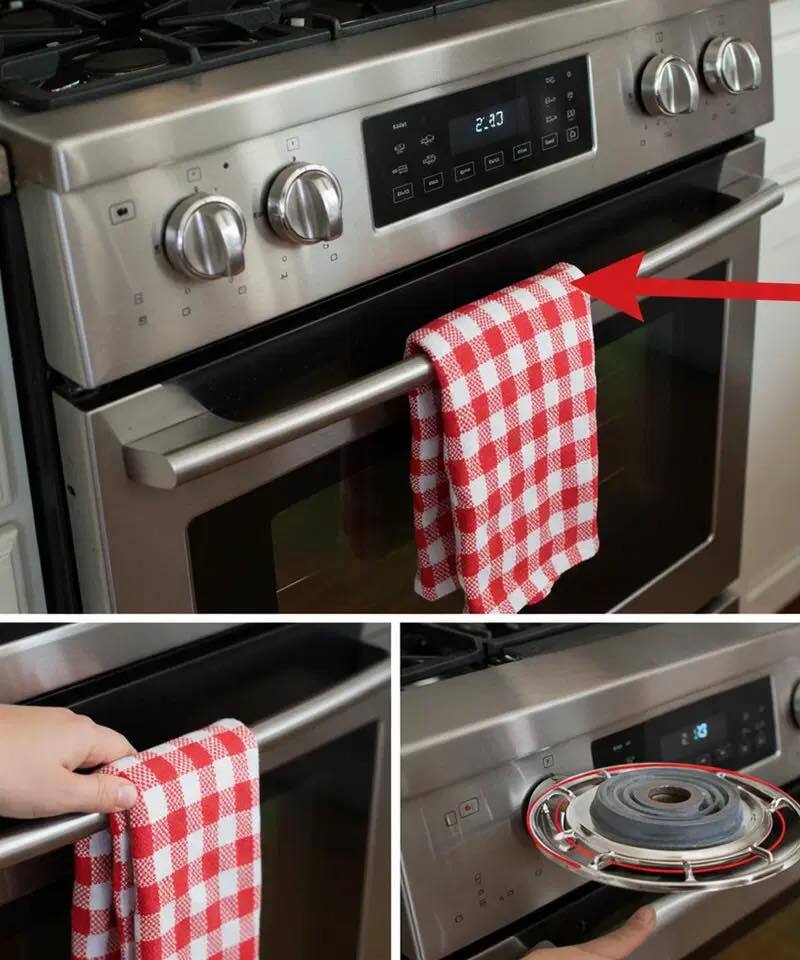In every kitchen, dish towels are a must-have tool—convenient, versatile, and constantly used. Whether you’re drying your hands, wiping down the countertop, cleaning dishes, or tackling unexpected spills, these cloths are always within reach. However, there’s one common mistake many people make without even realizing it: hanging a dish towel on the oven door. It might seem like a harmless and even practical habit, especially if you’re hoping the heat from the oven will help the towel dry faster.

But what seems like a clever shortcut can actually pose some real risks to your kitchen hygiene and safety. Let’s take a closer look at why this is a bad idea and what you should be doing instead. First and foremost, kitchen towels are supposed to help maintain cleanliness, not compromise it. Their role is to wipe down surfaces, dry clean dishes, and keep your hands sanitary while cooking. So naturally, you want them to stay as clean as possible. Unfortunately, hanging a towel on the oven door does the opposite. The oven handle is one of the most frequently touched surfaces in the kitchen.
Think about how often you open that door with flour-covered fingers, greasy hands, or after handling raw meat. Most people don’t stop to wash their hands before touching the oven, and that makes the handle a hotspot for bacteria. When you hang a towel there, you’re basically placing it in direct contact with a germ magnet. That towel, once clean, becomes a breeding ground for bacteria and contaminants. Then, you use it to dry a clean plate or wipe your freshly washed hands—and just like that, you’re spreading germs instead of eliminating them. Beyond bacteria, there’s also the issue of fire safety. Leaving a fabric towel dangling near or against an active oven can be a potential fire hazard, especially if the oven is on and the heat causes the material to catch fire. While most modern ovens are designed with safety in mind, it’s still not a good idea to have flammable materials so close to a heat source.
Even if the towel doesn’t ignite, prolonged exposure to heat can cause it to degrade faster, lose its absorbency, or start to smell unpleasant over time. If keeping things clean and safe in the kitchen is a priority—and it should be—then it’s important to rethink where and how you store your kitchen towels. Hanging them on a dedicated towel rack, hook, or over the handle of a lower cabinet is a much better option. This way, you avoid contamination and reduce the risk of them coming into contact with dirty surfaces. Of course, cleanliness doesn’t stop at placement. Dish towels should be cleaned frequently to stay sanitary.
Just giving them a rinse or a quick wash in cold water isn’t enough. Because of the bacteria they’re exposed to, especially if they’re used multiple times a day, it’s crucial to wash them at high temperatures. The most effective way to kill bacteria is by washing your kitchen towels in the washing machine using a cycle of at least 90°C. That might sound extreme, but it’s necessary to eliminate harmful germs. For even better results, consider adding a scoop of baking soda to the drum during the wash. Baking soda is a natural deodorizer and helps remove stubborn stains and odors, making your towels not only cleaner but fresher too. It’s a simple, affordable way to extend the life of your towels while ensuring they stay hygienic. In the end, kitchen hygiene isn’t just about what you cook—it’s also about the tools you use and how you care for them. Something as small as where you hang your towel can make a big difference in maintaining a clean and safe cooking space. So the next time you’re tempted to toss your dish towel over the oven handle, remember that it’s not the smartest spot. Keep your kitchen cleaner, your food safer, and your home a little more secure by storing towels properly and washing them regularly. A few small changes in your routine can go a long way toward a healthier, more efficient kitchen.





